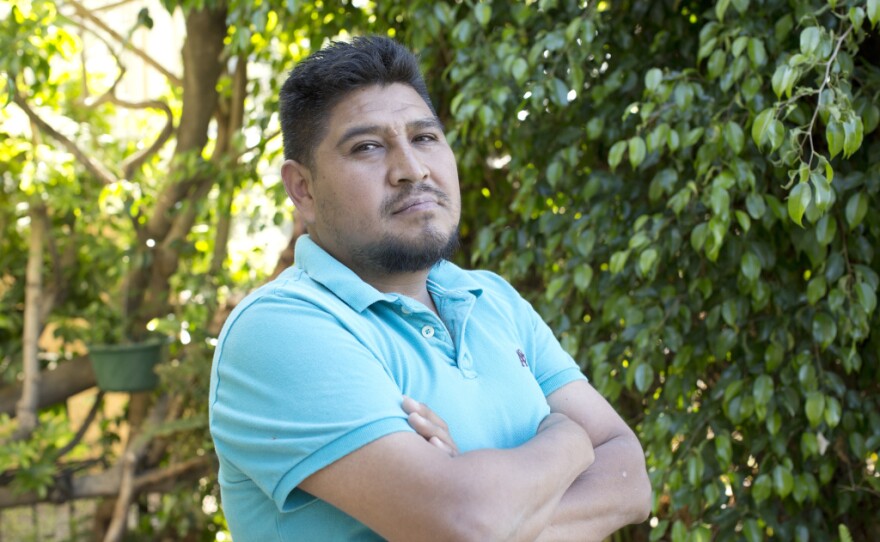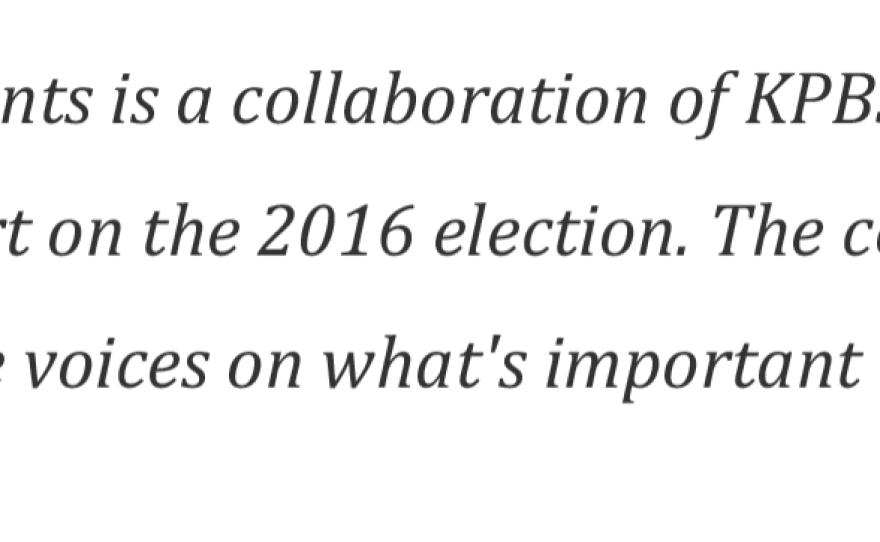Some Californians can vote, but don’t. Then there are others who would like to, but can’t.
A fledgling voter project aims to bring the two groups together for this year's November election. The idea is to pair nonvoters who can't cast ballots with people who can.
"We’re going to match up a U.S. citizen with someone who is, unfortunately, not able to go on Election Day and participate," said Francisco Medina, 30, a Huntington Park resident and one of the organizers of a project called Vote Allies.
Medina’s name may ring a bell. He made headlines last summer as one of two men without legal resident status who were appointed to city commissions in Huntington Park in Southern California. The appointments drew mixed reaction — criticism, support and the observation that the appointments amounted to another sign of how immigrants without legal status are integrating into California society.
Vote Allies is taking shape as the U.S. Supreme Court on Monday upheld the long-standing practice of drawing up legislative districts based on total population rather than on just those who are eligible to vote as citizens. Blue states like California with large numbers of residents illegally in the country could have seen a political shift favoring Republicans had the decision gone the other way.
Medina and fellow activist Brett Shears held their first public meeting in March to sign up participants in Vote Allies. Among those they're enlisting are U.S. citizens who are eligible to vote, in one group, and in the other, people who can't vote: non-citizen legal residents, immigrants without legal status, or citizens precluded from voting because of a past felony offense.
One of those who signed up to participate is 40-year-old Gabriel Zamora. He's active in his janitors union and has volunteered in campaigns for state and local candidates, canvassing neighborhoods and knocking on doors to urge people to vote.
Zamora can’t vote himself. While he has helped others fill out naturalization forms and apply for U.S. citizenship, he's not eligible to fill out his own application because he does not live in the country legally.
Zamora said in Spanish that he'd like to become a legal resident, but he doesn't qualify for any programs that would help him gain citizenship. Nonetheless, he remains civic-minded and active in the community.
“It’s something that fulfills me," said Zamora, who lives in South Los Angeles. He remembers he was similarly engaged in his native Mexico. "It makes me feel useful to society.”
A few blocks from Zamora’s house down Arlington Avenue, 34-year-old artist Jack Bangerter lives in his studio. He’s a U.S. citizen, raised in Idaho, and can vote.
Bangerter said his voting has been largely consistent; he's cast ballots in most major elections. But "sometimes I haven’t voted," he admits. "I’m out of the country or something."
Bangerter has never met Zamora, but they might soon. Organizers of the Vote Allies said they'd like to pair up people who live near one another, people who know one another in some other way, or willing relatives.
"They are going to participate in this voting process together. We're going to have them educate each other about their issues. We're going to have them educate each other about the process," said Shears, a recent University of Southern California public policy graduate who teamed up with Medina to reach immigrants who might participate in the project.

Technically, there’s nothing illegal about U.S. citizens who can vote and immigrants who can't sharing their political thoughts ahead of the election. If they find common ground on candidates and issues, they could "share" a vote.
But for some, the idea of people without legal status getting involved in any part of the political process just doesn’t sit right.
“It matters greatly, if we take the notion of citizenship and sovereignty seriously, that those who are citizens are the ones informing their government, and those who are not citizens that are here as visitors don’t have any more say about how to run the household than a guest you might have overnight at your house,”said John Eastman, who teaches constitutional law at Chapman University. "
This is where people like Francisco Medina beg to differ. Medina has lived in the U.S. since he was 16. He's been volunteering in his community since he was in his 20s and he doesn’t see himself as a guest.
“This is my country, this is my community, this is where I live," Medina said. I’m not going anywhere.”
The same goes for Stephanie Martinez, who has also signed up for the voting project. The 23-year-old college student from Huntington Park can live and work in the U.S. legally through "deferred action," the federal program that shields some young immigrants from deportation. But she still can’t vote.
“To work with someone and say, 'You know what? Let’s work together, learn together, and on my behalf, if you don’t want to vote for yourself, do it for me.' I feel like that is something really motivating," Martinez said.
Like Medina, Martinez also volunteers in her community. She's studying early childhood education, and spends time without pay helping in local elementary school classrooms.
"I guess, being able to know what it was like to struggle in a new language, I like to help other students who are in the same situation," Martinez said.
Civic involvement among immigrants who don't have legal status isn't new, said Manuel Pastor, a sociologist who co-directs USC's Center for the Study of Immigrant Integration. Immigrants participate in their children's schools and on neighborhood councils, which don't require members to be citizens or legal residents.
Pastor sees the voting project as a natural outgrowth of this, allowing people who are otherwise engaged to find a way to "vote" symbolically.
"It allows people with a lot of skin in the game in this country a way to get a voice by essentially relying on somebody else to be their voice," Pastor said.
He also likes the notion of building ties between non-citizens and citizens. "Those one-on-one ties are incredibly important, because when you humanize the situation of undocumented people, empathies turn into political change,” he said.

Bangerter, the South L.A. artist, isn't sure yet who he'll be paired up with and he isn't sure they'll agree on everything, but he's game to try.
"We've got tons of people who vote without knowledge, and tons of people who don't vote at all. So if people are active, I think it's great," Bangerter said. "And it seems like fun to get to know people like that, too."
As for those who can vote but don't, Zamora has a few words for them.
"You have to vote," Zamora said in his native language. "It’s not only a right, it’s an obligation. We have the advantage of living in a democratic country.”
What does voting mean to you? Tell us on social media using the hashtag #IfIHadAVote. Click here to answer our query and become a source.
Copyright 2016 KPCC. To see more election coverage, visit http://www.kpcc.org.







